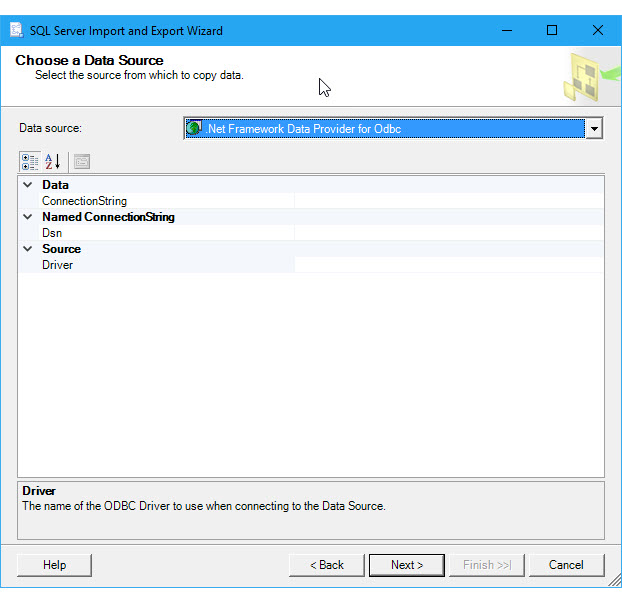Connect to an Oracle Data Source (SQL Server Import and Export Wizard)
Applies to:
SQL Server
SSIS Integration Runtime in Azure Data Factory
This topic shows you how to connect to an Oracle data source from the Choose a Data Source or Choose a Destination page of the SQL Server Import and Export Wizard. There are several data providers that you can use to connect to Oracle.
Important
The detailed requirements and prerequisites for connecting to an Oracle database are beyond the scope of this Microsoft article. This article assumes that you already have Oracle client software installed and that you can already connect successfully to the target Oracle database. For more info, consult your Oracle database administrator or the Oracle documentation.
Connect to Oracle with the .Net Framework Data Provider for Oracle
After you select .NET Framework Data Provider for Oracle on the Choose a Data Source or Choose a Destination page of the wizard, the page presents a grouped list of options for the provider. Many of these are unfriendly names and unfamiliar settings. Fortunately, you only have to provide two or three pieces of information. You can ignore the default values for the other settings.
Note
The connection options for this data provider are the same whether Oracle is your source or your destination. That is, the options you see are the same on both the Choose a Data Source and the Choose a Destination pages of the wizard.
| Required info | .Net Framework Data Provider for Oracle property |
|---|---|
| Server name | Data Source |
| Authentication (login) info | User ID and Password; or, Integrated Security |
You don't have to enter the connection string in the ConnectionString field of the list. After you enter individual values for the Oracle server name (Data Source) and login info, the wizard assembles the connection string from the individual properties and their values.

Connect to Oracle with the Microsoft ODBC driver for Oracle
ODBC drivers aren't listed in the drop-down list of data sources. To connect with an ODBC driver, start by selecting the .NET Framework Data Provider for ODBC as the data source on the Choose a Data Source or Choose a Destination page. This provider acts as a wrapper around the ODBC driver.
Here's the generic screen that you see immediately after selecting the .NET Framework Data Provider for ODBC.

Options to specify (ODBC Driver for Oracle)
Note
The connection options for this data provider and ODBC driver are the same whether Oracle is your source or your destination. That is, the options you see are the same on both the Choose a Data Source and the Choose a Destination pages of the wizard.
To connect to Oracle with the ODBC Driver for Oracle, assemble a connection string that includes the following settings and their values. The format of a complete connection string immediately follows the list of settings.
Tip
Get help assembling a connection string that's just right. Or, instead of providing a connection string, provide an existing DSN (data source name) or create a new one. For more info about these options, see Connect to an ODBC Data Source.
Driver
The name of the ODBC driver, Microsoft ODBC for Oracle.
Server
The name of the Oracle server.
Uid and Pwd
The user ID and password to connect.
Connection string format
Here's the format of a typical connection string.
Driver={Microsoft ODBC for Oracle};Server=myServerAddress;Uid=myUsername;Pwd=myPassword;
Enter the connection string
Enter the connection string in the ConnectionString field, or enter the DSN name in the Dsn field, on the Choose a Data Source or Choose a Destination page. After you enter the connection string, the wizard parses the string and displays the individual properties and their values in the list.
Here's the screen that you see after entering the connection string.

What's my Oracle server name?
Run one of the following queries to get the name of your Oracle server.
SELECT host_name FROM v$instance
or
SELECT sys_context('USERENV','SERVER_HOST') FROM dual
Other data providers and more info
For info about how to connect to Oracle with a data provider that's not listed here, see Oracle connection strings. This third-party site also contains more info about the data providers and the connection parameters described on this page.